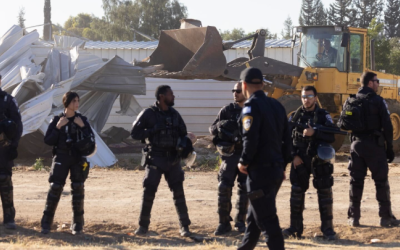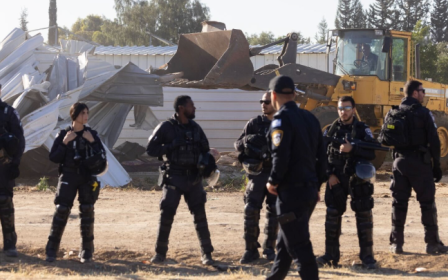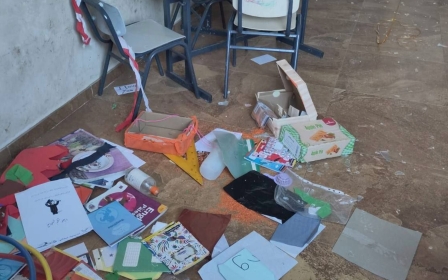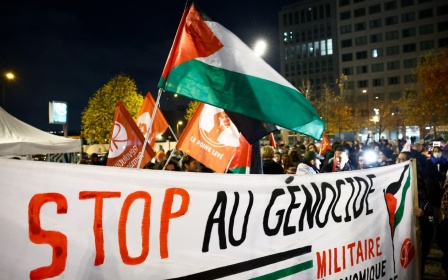Israel's destruction of Umm al-Hiran: A Palestinian village erased

After over two decades of struggle, the village was destroyed quietly.
Last week, the people of Umm al-Hiran were expelled from their homes, but unlike most demolitions, everything proceeded without event.
Residents of the Palestinian village in southern Israel’s Negev (Naqab) desert demolished their own houses, hoping to salvage some building materials, household belongings and animals.
In 2017, things had been quite different. Then, a previous round of demolitions resulted in the fatal shooting of a 47-year-old schoolteacher, Yaqoub Abu al-Qia’an, by police. The incident created a media firestorm.
This time round, there was little coverage, and residents had no way to protest or resist.
New MEE newsletter: Jerusalem Dispatch
Sign up to get the latest insights and analysis on Israel-Palestine, alongside Turkey Unpacked and other MEE newsletters
Fearing violent eviction or being fined, they instead tore down their own houses, despite in many cases having nowhere else to go. They will be replaced by Jewish settlers.
According to a lawyer acting for the village’s residents, in September a long meeting was held with the Israeli government’s Bedouin Authority “with the aim of reaching agreements”. After this meeting, the authority stopped responding.
This year, three villages have already been emptied and razed in the Negev, including Wadi al-Khalil, and the village of Ras Jrabah is also in immediate danger.
That the residents evacuated and destroyed their own houses was not enough for state authorities. They had left their mosque intact. And so, hundreds of special police, with helicopters hovering overhead, swarmed the village on Thursday morning.
The residents were gone. No houses remained standing. Fewer than 20 activists, journalists and now-former-residents were present when the police destroyed the village mosque, having first posted a notice of a fine due for the costs of demolition since the residents had failed to raze it themselves.
“We are God-fearing people,” one expelled resident explained to a policeman. After that, engineering equipment cleared the ruins of the village, ensuring that not a wall or door was left standing.
Before destroying the mosque, Israeli police arrested one of the leaders of the local struggle, Raad Abu Al-Qia’an, and two members of his family, to prevent them from being present for the last act of the evacuation. Only a few cats remained.
Ben-Gvir in charge
Around 300,000 Palestinian citizens of Israel live in the Negev region, including 100,000 who live in 30 unrecognised villages that lack essential public services, including means of transportation, roads, and schools.
Amichai Chikli, Israel’s minister for diaspora affairs, oversees the Bedouin Authority. This week, Chikli presented to the cabinet data showing a 400 percent increase in demolitions.
From his perspective and that of the authorities, Umm al-Hiran is just another number on the way to “governance”. Two other villages in the area were recently destroyed and there are another 11 scheduled to suffer the same fate.
A statement from Israel’s ministry of national security, headed by hardline right-winger Itamar Ben-Gvir, noted that the demolition is "minister Ben-Gvir's policy”.
The statement quoted Ben-Gvir explicitly: “My policy is clear; we will not allow illegal construction and land takeovers and we will enforce the law using the requisite means and force... This is the only way to return governance and sovereignty to the Negev, which has been abandoned for many years.”
“When you come to destroy someone’s house, first of all find him an alternative,” said Najah Abu al-Qia’an quietly as he stood near the bulldozers. “Under this policy, it’s impossible to expect a better future.”
In a different reality - perhaps even just a few years ago - the Israeli state’s preference was for residents to demolish their own homes. This way, the state could claim residents had left “voluntarily”, avoiding dreadful scenes of forced eviction.
This is not the case with Ben-Gvir in charge. The aim is to achieve a “picture of victory” at the expense of the desperate residents, who only want to live quietly and who have already lost all hope for any prospects of resistance.
It’s “the minister’s policy,” as Ben-Gvir’s ministry so proudly announced while the latest round of demolition was still in progress: “The fate of any illegal house is the same: demolition. I am proud to lead a strong policy of the demolition of illegal houses in the Negev.”
At the mercy of the Israeli state
Umm al-Hiran’s Palestinian residents – or their descendants – were dispossessed of their ancestral lands following the Nakba and the creation of the Israeli state in 1948.
After being moved around by the nascent state of Israel’s military government they were settled at their current site near the Yatir forest in 1956, to guard what was then the border with Jordan.
In 2002, the Israeli government decided to establish settlements in the northern Negev, demanding the evacuation of Umm al-Hiran. Residents refused and a legal battle ran on until 2015, when the Israeli Supreme Court ruled that they be evicted.
'We are lost now, under this crazy government. There are no values left, no human dignity, no humanity or responsibility on the part of the state toward its residents'
- Ra’ad Abu al-Qia’am, village leader
On the eve of the deadly evacuation in 2017, the residents were on the point of signing an agreement with the state, but the police did not wait and raided the village.
What has happened since then – and particularly recently - encapsulates the Israeli establishment’s attitude towards native nomad citizens.
An entire community has been demolished to make way for a vanguard group of Jewish settlers, despite the area’s plentiful open land. Any option to recognise the village and enable a neighbourly relationship with Jewish residents has been refused.
The connection Palestinian native nomad residents have to their land has been denied, even though it was Israel’s own military administration that dumped them on the site of the village in the 1950s.
Then there is the all-fronts war waged by the government, which includes, among other things, a High Court ruling permitting evacuation, the cancellation of the agreement to compensate all the residents that was signed by the head of the Bedouin Authority, and the insistence on expulsion now, even though the residents are pleading for a compromise that would provide some option for housing.
And, of course, the story also includes the January 2017 assault on the village carried out by hundreds of policemen in the dark, and the indiscriminate shooting that led to the death of Yacoub Abu al-Qia’an and policeman Erez Levy.
This was followed by the official incitement against Abu al-Qia’an, which Prime Minister Benjamin Netanyahu was eventually made to apologise for in 2020, though he made no real acknowledgement of injustice and there was no compensation.
While the police claimed from the outset that there had been a terrorist “attack” leading to the shooting of al-Qia’an, Israeli website Local Call published evidence contradicting this version of events. Subsequent reports further exposed the lies told by the police on that day.
Umm al-Hiran had already been the focus of a campaign by right-wing organisations over the decade preceding 2017.
The Facebook page of Dror, the Jewish settlement slated to move into the area after the evacuation, quotes Chikli, the diaspora minister and Bedouin Authority head, saying that Umm al-Hiran is “undoubtedly one of the most important and strategic settlements in the country".
Chikli recently spoke at a meeting of the Ministerial Committee for Bedouin Society of a 400 percent increase in the execution of demolition orders in Bedouin communities in 2024, as compared to 2023.
After Umm al-Hiran’s demolition, the Israel Lands Authority stated: “In accordance with the court's ruling, the Israel Lands Authority, accompanied by the Israel Police, evacuated the rest of the dispersion in Umm al-Hiran in the Negev after most members of the tribe had self-evacuated.”
Infrastructure work for the new Jewish settlement had already began on part of the village’s land after the demolition of 2017. Initially it was called Hiran.
Now, a small sign says: “Building site – new community of Dror”. Currently, the settlers who will move there live in the Yatir Forest, waiting for their homes to be built.
The last days
Last week, Yacoub Abu al-Qia’am’s children and other relatives gathered under an open sky where his house once stood. They have been evicted from temporary shelters that were erected after the family’s residential compound was demolished.
One of al-Qia’am’s children, aged around 30, said: “This is a very difficult feeling. They force you to demolish your house with your own hands. I keep reliving what happened in January 2017, the incursion and the destruction.
'I always thought that at the last minute there would be a solution allowing us to stay here by agreement'
- Maryam al-Qia'am, resident
“In the last few days we have been here, living our lives without even a roof over our heads, and it’s already starting to get cold,” he said.
“They chose this point to throw us out of here, forcing us to do the demolition. We aren’t on the list [of those receiving compensatory plots of land from the state], and we say: you cancelled [the agreement with us], so provide a solution for us.”
Yacoub’s nephew spoke up. “People ask us why we demolished our own houses. The answer is that we are living in fear. On 10 November, the expulsion order went into effect. You might say that this is the height of the failure by the government.
“People lost their father, their way of life, and still for years they have wanted to demolish here, and you don’t resist, there is a negotiation in process, we have sent the message in every way possible that we are prepared to move. The simple question is where do we go from here? I respect the court ruling, but provide an alternative. Without an alternative, in another few years we will be reprising the same story of expulsions and evacuations and demolitions and all that.”
Ra’ad Abu al-Qia’am, one of the leaders of the struggle against the demolition of the village, has been running for years from one demonstration to another, from one meeting with government authorities to another, being interviewed and guiding tours of the village.
A 2015 High Court decision ruled that the planned settlement would not prevent Palestinians from living there. Raad said had said he would still “buy a plot of land and return to live in the village,” but, based on past experience, this is unlikely to happen.
Last week, for the first time, he looked broken. Sitting outside his house, most of which had been emptied, he struggled to hold back the tears. He is moving to a temporary shelter on a lot in Khura, a Palestinian town.
“I did not think, did not even dream that this would happen. We are lost now, under this crazy government. There are no values left, no human dignity, no humanity or responsibility on the part of the state toward its residents,” he said.
“There is only destruction. I did not believe that they would do this to us, especially given what happened in 2017, the disaster that happened because of this toxic, insane, murderous policy.”
In his recounting, the government wants the demolition of the village “to set an example for the Negev. So that people will see that the most determined hardcore, the legal, righteous and legitimate struggle, having stood its ground for 25 years, was finally destroyed by force - and now, the destruction of any community has become possible”.
“You could relocate all of the greater Tel Aviv area here, there is enough room for 3 million people in the Negev,” said Ra’ad, pointing to all the empty space around him. “But from Kiryat Gat southward we are living under military, not civilian, rule, without law and order. Offenders, criminals, terrorists, that’s who is running the Negev.”
Inside Ra’ad’s house, his family were busy dismantling and packing things in preparation for the move to the structure they erected in Khura. “This whole community is one collective,” he said. “They are taking us to a place where we don’t know how long we might be there, or whether there will be another round of displacement, and they are dismantling our culture, our society.”

Ra’ad’s wife Maryam was also busy packing up the household. The furniture has been taken out, the windows dismantled, and the family have been sleeping on mattresses on the floor.
“We won’t even be able to come back here to visit,” she said. “They will erase the place; it will become foreign to us. This has already happened to my family, when we lived at Kadesh Barnea.”
She said the family was planning to stay in the village under the last possible moment. “We will stay here until the new house is ready or until this one is in ruins.”
Like many others, Maryam too had hoped that the expulsion would not take place.
“I always thought that at the last minute there would be a solution allowing us to stay here by agreement. I did not believe that we would have to leave, and so now I am in shock, I’m depressed,” she said.
Over the last few weeks, the police have come to the village almost daily, preparations for the evacuation and keeping an eye on what is going on.
“It scared me, it affected me and my daughters,” Maryam said. As for the future, and the move to Khura, the Palestinian mother is unsure.
"Conditions there are hard, the plot of land is not large, there is no open space like there is here," she said. "And later on, they might destroy our home again."
A version of this article was originally published in Hebrew on the Local Call website.
Middle East Eye delivers independent and unrivalled coverage and analysis of the Middle East, North Africa and beyond. To learn more about republishing this content and the associated fees, please fill out this form. More about MEE can be found here.








